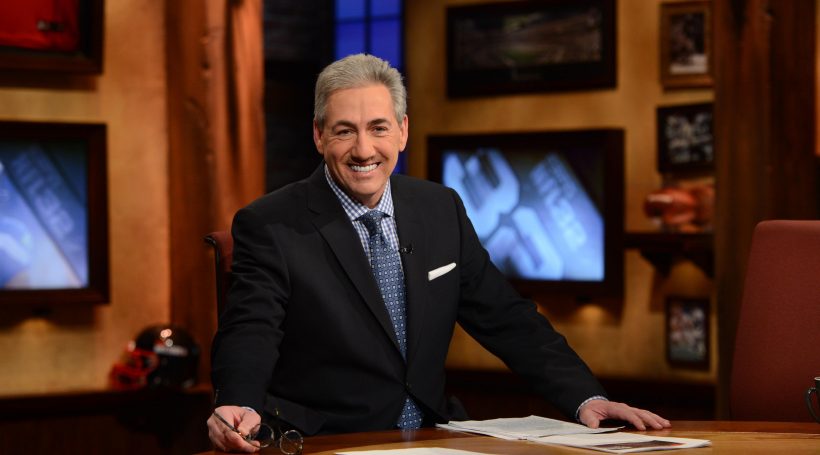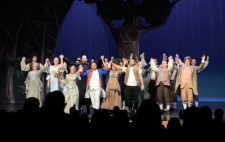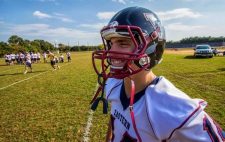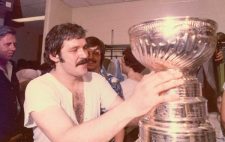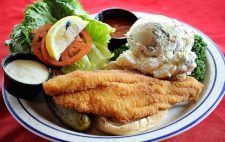For years, Sal Paolantonio was well known in the tri-state area as a political writer for the Philadelphia Inquirer, then as the author of former Philly mayor Frank Rizzo’s biography, a project the controversial politician gave his blessing to. But for almost 20 years, sports fans have known Paolantonio – who goes by SalPal – as one thing: an authority on NFL football. A resident of Moorestown, Paolantonio spends the NFL season watching, talking, breathing football. He’s interviewed legendary coaches and defeated athletes, and sometimes tells fans – in rather direct language – just how bad he thinks a particular player is (think TO). He spends much of the summer studying for the upcoming season, unless of course, he’s heading out for a bike ride in Avalon.
Who has been your favorite interview?
In a 30-year journalism career, I’ve interviewed presidents, politicians and public officials, athletes and coaches from every major sport, so it’s difficult to pick one favorite interview. But I had an unforgettable experience interviewing the young men and women on the northern plains of Ethiopia who were battling the worst drought and famine in African history in the spring of 1985. Their courage and determination to survive in the face of overwhelming hardship brought on by man and nature was inspiring and humbling. Not only were they fighting for their daily bread but doing so in the midst of the Eritrean Civil War. It’s something I will carry with me for the rest of my life.
Why were you in Ethiopia?
My first newspaper, the Albany Times Union, sent me to East Africa during the famine of 1985 to follow the questionable activities of an Albany-based relief organization setting up shop in Addis Ababa and Mekele in Ethiopia. The stories I wrote landed me a job at a number of big-city newspapers, including the Inquirer, where the legendary editor Gene Roberts was leading a team of reporters to Pulitzer Prizes year in, year out. So of course I wanted to work for him. And I promptly went from covering the famine in Africa to writing about school board elections in Medford Lakes. I was part of the first South Jersey bureau of the Inquirer in 1985. I covered Jim Florio’s rise and fall, then moved over to Philly, where I met and wrote about Frank Rizzo and the bare knuckles fight to control City Hall.
Why did you write a book about Frank Rizzo?
It had to be done. Frank Rizzo was the most important public figure in Philadelphia in the 20th century, a dynamic, complicated, charismatic creature of the streets who ruled the city’s police force for 20 years and ran for mayor five times. In addition, Rizzo’s story was the Italian-American story: the rise from immigrant roots to urban legend. So my biography is really the story of working-class Philadelphia and its fight against the old guard power of the city, and then the rise of the African-American community and the emergence of a new political power that resulted in Ed Rendell’s election after Rizzo died right in the middle of the 1991 mayoral race. It’s a movie, really. Hopefully, someday, somebody will make it.
How did you get to interview Richard Nixon for the Rizzo book?
When I was working on Frank Rizzo’s biography, I went to see Big Frank in his home in Chestnut Hill to interview him and told him I wanted to speak to Richard Nixon, who at the time was retired and living in North Jersey. We were sitting at his kitchen table and Rizzo had this enormous black loose-leaf binder and he slid it across the table and told me to look up the former president’s phone number. So I flipped to N in the book, dialed the number, handed the phone to Rizzo, who talked to Nixon, and then handed the phone to me. Nixon – just hearing that voice was pretty cool – told me to submit questions in writing to his secretary, which I did. Nixon rarely did interviews for biographers – it would have occupied every waking moment of his day. But he loved Rizzo so much he agreed to cooperate. The result was a chapter in my book called, The Mayor and the President.
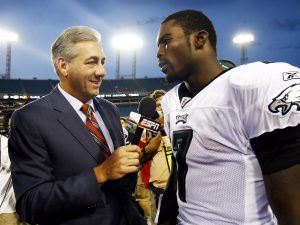
Sunday, Sept. 26, 2010 — Jacksonville, Fla. — EverBank Field — ESPN reporter Sal Paolantonio (l) interviews Philadelphia Eagles quarterback Michael Vick.
When you made the move to ESPN, did you think the network would reach the status it now has?
I knew it was going to grow and compete. What convinced me to leave The Philadelphia Inquirer in 1995 – at that time, one of the best newspapers in the country – was the vision and creativity of some of the former newspaper people then being brought to ESPN, particularly a guy named Jim Cohen – a former Inquirer sports editor who hired a bunch of writers like myself and then went on to create “Pardon the Interruption,” one of the most popular shows on sports TV. I never worked for him at the Inquirer, and I jumped at the chance to do so at ESPN.
What was the toughest sports interview you’ve had to do?
That’s easy. 1997, NFL Draft, New York Jets, head coach Bill Parcells. I had to ask him about remarks Keyshawn Johnson made in his book criticizing his teammates, live on the air. Parcells didn’t want to talk about it, refused to answer the questions, including three follow-ups. It was very uncomfortable. And after I threw it back to Chris Berman at the anchor desk, Parcells cussed me out and threw me out of the Jets headquarters. We didn’t talk for years, but we finally mended fences. In February, as a member of the Pro Football Hall of Fame Selection Committee, I voted for Parcells to be inducted into Canton. Great coach. Reminds me of my late father, Vito: all bluster, all heart.
Are criticisms of professional athletes justified?
I love writing about professional athletes. These are driven, competitive people who are at the top of their craft. Remember something: there are hundreds of thousands of high school students in the U.S., only one percent of them will be the starting quarterback on their high school team. Only one percent of them will be the starting quarterback on a Division I college football team. And only one percent of them will ever be a starting NFL quarterback. That’s the elite of the elite. Those jobs are hard to get, easy to lose. When I talk to a pro quarterback, I think about that all the time. These men are different from you and me, so start from that vantage point, respect it and try to make them relate to the rest of us. That’s my job.
What does it take to be a great athlete?
You have to have what I call B.G.T. – Big Game Temperament. A great athlete performs at the highest level when the stakes are the highest.
How do you feel when you interview someone who has just experienced a big defeat?
The best stories are always in the loser’s locker room. There are only 16 games in an NFL season. Every loss opens up a player, a team and an organization to the raw re-assessment of purpose, plan and desire. There is mental and physical pain. If you are a good reporter, you will find the right players to talk to and ask the right questions. Philly is a big market with some great reporters – so it is a highly charged and competitive exchange of questions and answers, a sweaty scrum where you have to be respectful of the player’s space, but realize that you are working for the readers, listeners and viewers who pay good money to watch the games and want answers. It’s a fine line you have to walk. It takes instinct and experience. And it’s not for everybody. Some players, such as Brian Dawkins, responded well and were honest. Others will try to hide their emotions. (See: Donovan McNabb.) Can’t do that in this town.
Do people stop you everywhere you go and want to talk sports?
Yes, of course. And it’s great. My favorite is when my wife Lynn and I are riding our bikes around Avalon in the summer, right before Eagles training camp opens up. And some guy will spot me and just yell two words: “Whaddya think?” And he and I know the lingo right away. And I’ll respond: “Hey, I think they gotta shot at 10-6 and the division.” (Translation: the Eagles are going to have a good year.) If you want to know the answer to that question for Chip Kelly’s team this year, however, I’m not giving it away in SJ Magazine. You’ve got to see me down at Uncle Bill’s Pancake House.
WEB BONUS:
Many people don’t know you taught journalism at St. Joseph’s University in Philadelphia. What was that like?
I loved interacting with the students at St. Joseph’s. I found them to be just like when I went to college, totally invested in their lives and education. Some of them have gone on to journalism careers at the Newark Star-Ledger, Rolling Stone, the Catholic Reporter and sports talk radio. I miss the classroom. I learned as much as I hope they did. There is nothing better than being in front of a group of hyper-connected young people who are ready to challenge your hard-boiled assertions, looking at you like you’re some calcified dude from the 1970s who hasn’t got a clue. It forces you to re-evaluate everything you think you know. I felt like I was the one going to school.
Who would you say is the greatest athlete alive?
Jerry Rice. Greatest football player of all time. Could score the football from anywhere on the field. His chemistry with Joe Montana and Steve Young will never be duplicated. It was a beautiful ballet performed on a field with men with violent intentions. And he should’ve won “Dancing with the Stars.” He got robbed.


